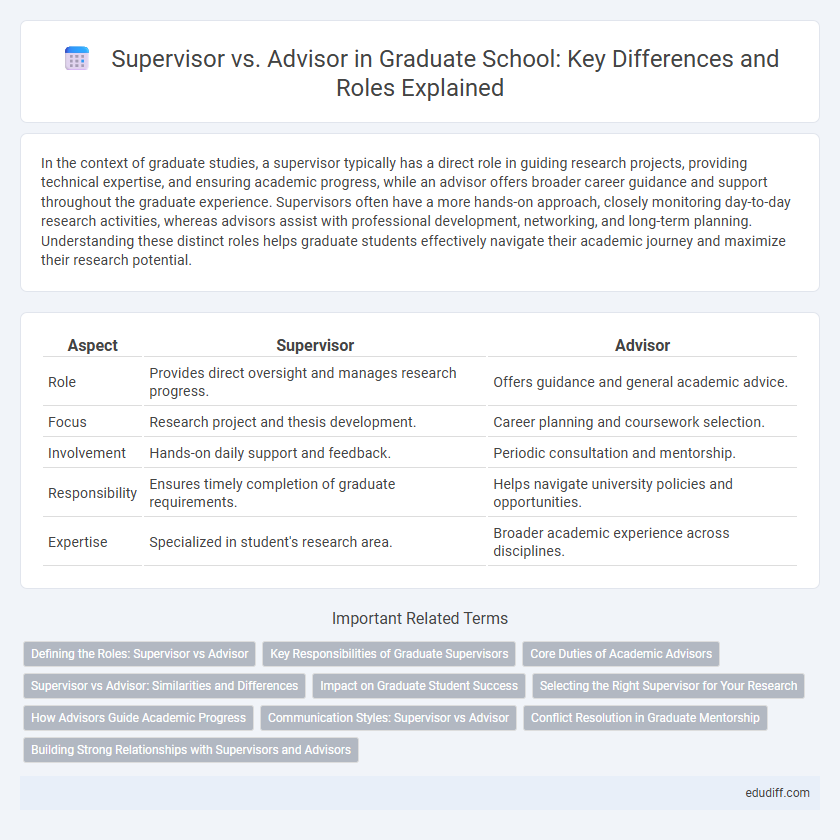In the context of graduate studies, a supervisor typically has a direct role in guiding research projects, providing technical expertise, and ensuring academic progress, while an advisor offers broader career guidance and support throughout the graduate experience. Supervisors often have a more hands-on approach, closely monitoring day-to-day research activities, whereas advisors assist with professional development, networking, and long-term planning. Understanding these distinct roles helps graduate students effectively navigate their academic journey and maximize their research potential.
Table of Comparison
| Aspect | Supervisor | Advisor |
|---|---|---|
| Role | Provides direct oversight and manages research progress. | Offers guidance and general academic advice. |
| Focus | Research project and thesis development. | Career planning and coursework selection. |
| Involvement | Hands-on daily support and feedback. | Periodic consultation and mentorship. |
| Responsibility | Ensures timely completion of graduate requirements. | Helps navigate university policies and opportunities. |
| Expertise | Specialized in student's research area. | Broader academic experience across disciplines. |
Defining the Roles: Supervisor vs Advisor
A graduate supervisor primarily oversees the research progress, ensuring the project meets academic standards and deadlines, while an advisor provides broader academic guidance, helping with course selection, career development, and administrative issues. Supervisors are directly involved in the day-to-day management of thesis work, offering detailed feedback and methodological support. Advisors, in contrast, serve as mentors who assist with overall academic planning and professional growth throughout the graduate program.
Key Responsibilities of Graduate Supervisors
Graduate supervisors oversee research project development, ensuring rigorous methodology and academic integrity throughout the study. They provide critical feedback on thesis drafts, guide problem-solving approaches, and facilitate professional growth by linking students with relevant academic and industry networks. Supervisors also monitor progress milestones, manage time effectively, and support publication efforts to enhance the graduate's academic profile.
Core Duties of Academic Advisors
Academic advisors primarily guide graduate students through course selection, program requirements, and career planning to ensure successful degree completion. They monitor academic progress, provide resources for overcoming challenges, and facilitate communication between students and faculty. Unlike supervisors who oversee specific research projects, advisors maintain a broader, ongoing support role throughout the graduate experience.
Supervisor vs Advisor: Similarities and Differences
A graduate supervisor and advisor both play critical roles in guiding students through academic research and program completion, with overlapping responsibilities such as providing expertise, feedback, and support. The supervisor primarily oversees the research project's direction, methodology, and progress, ensuring academic rigor and adherence to institutional requirements, while the advisor often assists with broader academic planning, course selection, and career advice. Clear communication and defined roles help optimize a graduate student's experience by leveraging the complementary strengths of both positions.
Impact on Graduate Student Success
A supervisor provides direct oversight and guidance on research projects, ensuring methodological rigor and academic quality, which significantly enhances graduate student success by fostering deep expertise. An advisor offers broader academic and career counsel, helping students navigate course selections and professional development pathways, thereby strengthening long-term outcomes. The combined influence of both roles creates a comprehensive support system that optimizes graduate student achievement and timely degree completion.
Selecting the Right Supervisor for Your Research
Selecting the right supervisor for your graduate research is crucial for academic success and professional growth. A supervisor provides subject-matter expertise and guides the research direction, while an advisor may offer broader academic or career advice. Prioritize finding a supervisor whose research interests align closely with your own and who demonstrates effective mentorship and availability.
How Advisors Guide Academic Progress
Advisors play a crucial role in guiding academic progress by helping graduate students develop research plans, select appropriate coursework, and navigate degree requirements. They frequently monitor milestones such as thesis proposals and comprehensive exams to ensure timely advancement. Through regular meetings, advisors provide tailored feedback and support, fostering successful completion of graduate programs.
Communication Styles: Supervisor vs Advisor
Supervisors typically adopt a directive communication style, providing clear guidance and structured feedback to manage research progress effectively. Advisors often engage in a collaborative and open dialogue, encouraging independent thinking and fostering a supportive environment for academic and personal growth. Understanding these communication styles helps graduate students navigate expectations and enhance their mentorship relationships.
Conflict Resolution in Graduate Mentorship
Graduate mentorship often involves distinct roles where supervisors primarily oversee research direction and academic progress, while advisors provide broader career guidance and emotional support. Conflict resolution strategies in graduate mentorship emphasize clear communication, setting mutual expectations, and timely intervention to address misunderstandings or disagreements. Effective mentorship hinges on balancing supervisory authority with advisory empathy to foster a productive and supportive graduate experience.
Building Strong Relationships with Supervisors and Advisors
Building strong relationships with supervisors and advisors is crucial for graduate success, as their guidance shapes research outcomes and academic development. Regular communication, clear goal-setting, and mutual respect foster trust and collaboration, enhancing problem-solving and feedback effectiveness. Understanding the distinct roles--supervisors focusing on research direction and advisors on academic planning--enables tailored support and maximizes the graduate experience.
Supervisor vs Advisor Infographic

 edudiff.com
edudiff.com